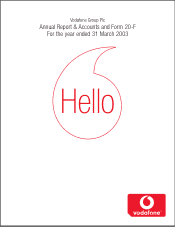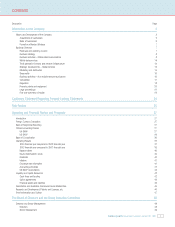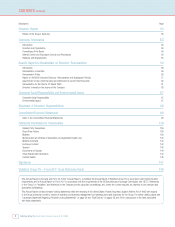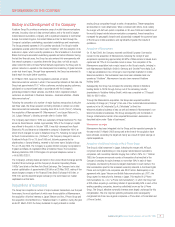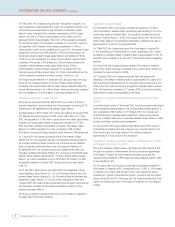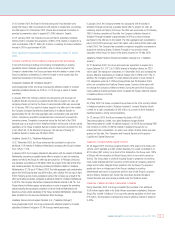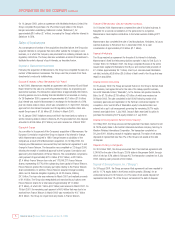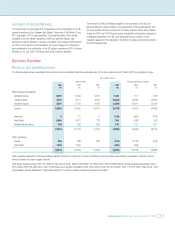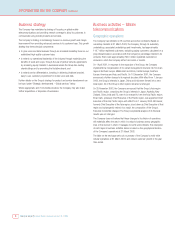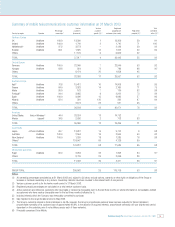Vodafone 2003 Annual Report Download - page 5
Download and view the complete annual report
Please find page 5 of the 2003 Vodafone annual report below. You can navigate through the pages in the report by either clicking on the pages listed below, or by using the keyword search tool below to find specific information within the annual report.
Vodafone Group Plc Annual Report & Accounts and Form 20-F 2003 3
INFORMATION ON THE COMPANY
History and Development of the Company
Vodafone Group Plc provides an extensive range of mobile telecommunications
services, including voice and data communications, and is the world’s largest
mobile telecommunications company, with a significant presence in Continental
Europe, the United Kingdom, the United States and the Far East through the
Company’s subsidiary undertakings, associated undertakings and investments.
The Group presently operates in 28 countries worldwide. The Group’s mobile
subsidiaries operate under the brand name “Vodafone”with the exception of its
business in Japan, which currently operates as J-Phone Vodafone. In the United
States the Group’s associated undertaking operates as Verizon Wireless. During
the last two financial years, the Group has also entered into arrangements with
five network operators in countries where the Group does not hold an equity
stake. Under the terms of these Partner Network Agreements, the Group and its
partner networks co-operate in the development and marketing of global services
under dual brand logos. Through these agreements, the Group has extended its
brand reach into eight further countries.
At 31 March 2003, based on the registered customers of mobile
telecommunications ventures in which it had ownership interests at that date, the
Group had approximately 119.7 million customers, excluding paging customers,
calculated on a proportionate basis in accordance with the Company’s
percentage interest in these ventures, and 296.0 million registered venture
customers, as described in “Business Overview – Business activities – Mobile
telecommunications”.
Following the completion of a number of major business transactions during the
last three years, the Group acquired controlling interests in certain non-mobile
telecommunications businesses, including Arcor AG & Co KG (“Arcor”), following
the acquisition of Mannesmann AG (“Mannesmann”), and Japan Telecom Co.,
Ltd. (“Japan Telecom”), following a tender offer in October 2001.
The Company was formed in 1984 as a subsidiary of Racal Electronics Plc. Then
known as Racal Telecom Limited, approximately 20% of the Company’s capital
was offered to the public in October 1988. It was fully demerged from Racal
Electronics Plc and became an independent company in September 1991, at
which time it changed its name to Vodafone Group Plc. Following its merger with
AirTouch Communications, Inc. (“AirTouch”), the Company changed its name to
Vodafone AirTouch Plc on 29 June 1999 and, following approval by the
shareholders in General Meeting, reverted to its former name, Vodafone Group
Plc, on 28 July 2000. The Company is a public limited company incorporated in
England and Wales. Its registered office is Vodafone House, The Connection,
Newbury, Berkshire, RG14 2FN England. Its principal telephone number is
+44 (0)1635 33251.
The Company’s ordinary shares are listed on the London Stock Exchange and the
Frankfurt Stock Exchange and the Company’s American Depositary Shares
(“ADSs”) are listed on the New York Stock Exchange. The Company had a total
market capitalisation of approximately £86 billion at 23 May 2003, making it the
second largest company in the Financial Times Stock Exchange 100 index, or
FTSE 100, and the eleventh largest company in the world based on market
capitalisation at that date.
Acquisitions of businesses
The Group has completed a number of major business transactions over the past
three years, the most significant of which were the acquisition of Mannesmann,
the acquisition of further interests in Japan Telecom and the J-Phone Group and
the acquisition of Airtel Móvil S.A. (“Vodafone Spain”). In addition, during the year
ended 31 March 2003, the Group increased its equity interests in certain
existing Group companies through a series of transactions. These transactions
are described in more detail below. When combined with others, most notably
the merger with AirTouch (which completed on 30 June 1999 and created one of
the world’s largest mobile telecommunications companies), these transactions
increased the geographic footprint and substantially increased the customer base
of the Group’s mobile operations, and significantly impacted the results of
operations.
Acquisition of Mannesmann
On 12 April 2000, the Company received conditional European Commission
consent to the acquisition of Mannesmann, following the receipt of valid
acceptances representing approximately 98.62% of Mannesmann’s issued share
capital and 99.72% of its convertible bonds in issue. The completion of the
Mannesmann acquisition had a major impact on the Group’s results, bringing in
both Mannesmann Mobilfunk GmbH in Germany and Omnitel Pronto Italia S.p.A
in Italy as subsidiaries in two of Europe’s most important markets for mobile
telecommunications. The businesses have since been rebranded and now
operate as “Vodafone”. Mannesmann has also been renamed Vodafone
Holding GmbH.
Subsequently, the Group has increased its ownership interest in Vodafone
Holding GmbH to 100% through the buy-out of the remaining minority
shareholders in Vodafone Holding GmbH, which was completed on 21 August
2002 for £281 million.
Through the Mannesmann acquisition, the Group also acquired beneficial
ownership of Orange plc (“Orange”), then one of four mobile telecommunications
operators in the UK, Infostrada S.p.A. (“Infostrada”) a fixed line
telecommunications business in Italy, as well as interests in Mannesmann’s non-
telecommunications businesses. The Group subsequently sold its interests in
Orange, Infostrada and certain other acquired Mannesmann businesses, as
described below under “Sales of businesses”.
Mannesmann synergies
Mannesmann has been integrated into the Group and the expected synergies for
the year ended 31 March 2003 announced at the time of the acquisition have
been achieved, exceeding the target set mainly as a result of higher savings on
capital expenditure.
Acquisition of additional interests in the J-Phone Group
The Group’s initial investment in Japan, following the merger with AirTouch,
comprised direct shareholdings in nine regional mobile telecommunications
companies, with ownership interests ranging from 4.5% to 15%. On 7 October
1999, the Company announced a series of transactions that resulted in the
Company increasing its equity interests to more than 20% in each of these
companies, and becoming the second largest shareholder in each venture. The
total consideration paid for the increased ownership interests in the three Digital
Phone and six Digital Tu-Ka companies was £342 million. Subsequently, in an
agreement with Japan Telecom and British Telecommunications plc (“BT”), the
Group agreed to restructure its interests in Japan. This resulted in J-Phone
Communications Co., Ltd. (“J-Phone Communications”), in which the Group had
a 26% stake, acquiring a controlling interest of approximately 50% in each of the
existing operating companies, becoming collectively known as the J-Phone
Group. The Group’s effective ownership interests were largely unchanged by this
reorganisation. The nine regional operating companies were subsequently
reorganised into three new regional companies, J-Phone East, J-Phone West and
J-Phone Central.

